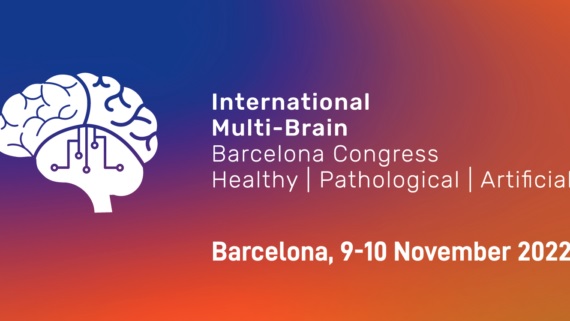The UB hosts the first edition of the International Multi-Brain Barcelona Congress

Is neurotechnology the new revolution in the study of the brain? What do we know about synaptic plasticity in neurodegenerative diseases? What psychological factors could enhance cognitive resilience? How can digital innovation be applied to mental health? Is the application of immersive reality in neurorehabilitation techniques effective? Understanding the biological bases of brain function, limiting the impact of neurodegenerative diseases and exploring the options now offered by new technologies are some of the challenges in biomedicine and public health in the 21st century that the Institute of Neurosciences of the UB (UBNeuro) is tackling.

Is neurotechnology the new revolution in the study of the brain? What do we know about synaptic plasticity in neurodegenerative diseases? What psychological factors could enhance cognitive resilience? How can digital innovation be applied to mental health? Is the application of immersive reality in neurorehabilitation techniques effective? Understanding the biological bases of brain function, limiting the impact of neurodegenerative diseases and exploring the options now offered by new technologies are some of the challenges in biomedicine and public health in the 21st century that the Institute of Neurosciences of the UB (UBNeuro) is tackling.
Addressing the frontiers of research and scientific knowledge to decipher the complexity of human brain function from an integrative viewpoint —the healthy brain, the pathological brain and the artificial brain— is the aim of the International Multi-Brain Barcelona Congress, which will be held at the Faculty of Medicine and Health Sciences of the UB from the 9th to the 10th of November, in a face-to-face format and online.
This scientific summit, which in its first edition will bring together nearly (...) neuroscientists from all over the world, is a pioneering proposal in the field of brain research. It has been organised by a committee from the Institute of Neurosciences of the UB (UBNeuro), headed by experts Sílvia Ginés, Jordi Alberch and David Bartrés-Faz, from the Faculty of Medicine and Health Sciences of the UB; Mercè Pallàs, from the Faculty of Pharmacy and Food Sciences, Petia Radeva, from the Faculty of Mathematics and Computer Science, and Mel Slater, from the Faculty of Psychology.
The opening will take place on the 9th at 9:15 am in the Paranimph of the Faculty of Medicine and Health Sciences, with the participation of the rector of the UB, Joan Guàrdia; Professor Jordi Alberch, director of UBNeuro; Antoni Trilla, dean of the Faculty of Medicine and Health Sciences, and Júlia Miralles de Imperial, head of Science and University Policies at the Barcelona City Council. T
his will be followed by the plenary session, with the lecture "Translation of neuroscience beyond academia", by the expert Michael Valenzuela, from the University of New South Wales (Australia), which will be presented by Professor David Bartrés-Faz.
From clinical research to machine learning with artificial intelligence
This scientific forum will present the most innovative discoveries in the field of neuroscience from a translational perspective, including basic research in the laboratory, clinical studies with patients and knowledge transfer for the benefit of society as a whole. It will be a platform that will bring together experts from various fields of knowledge —medicine, psychology, pharmacy, chemistry, physics, mathematics, engineering and computer science— as well as patients, in order to share new discoveries and generate synergies to advance the entire field of brain knowledge.
Among the attendants in this conference will be experts such as Míriam Pérez Cruz, from the Sant Joan de Déu Research Institute ("Neurosonography and brain electrophysiology in fetal neurodevelopment"); Nicolai Franzmeier, from the Ludwig Maximilian University of Munich ("Using multimodal neuroimaging to understand Alzheimer's disease progression"); Jesús Rodrigo, from the Spanish Alzheimer's Confederation ("Pathological brain. Is it only about aging?"); Christoph Guger, director of G.tec. Medical Engineering ("Current and future applications of brain-computer interfaces"), and Xavier Boix, from the Massachusetts Institute of Technology («The Neuroscience of learning Machines»).
An important part of the conference will focus on the knowledge transfer between the academia and the industry. The session will be chaired by Professor Petia Radeva and will include presentations by different American (Google), European (Tobii) and Spanish (INBRAIN Neuroelectronics, Bit Brain, Broomx, Neuroelectrics) neurotechnology companies on the applications of new neurotechnologies in the study of the brain.
The closing session, which will be chaired by Professor Jordi Alberch, will include the participation of the international expert in neurotechnology Rafael Yuste, from Columbia University, who will give the lecture "Neurotechnology: An upcoming revolution in science, medicine and society".
